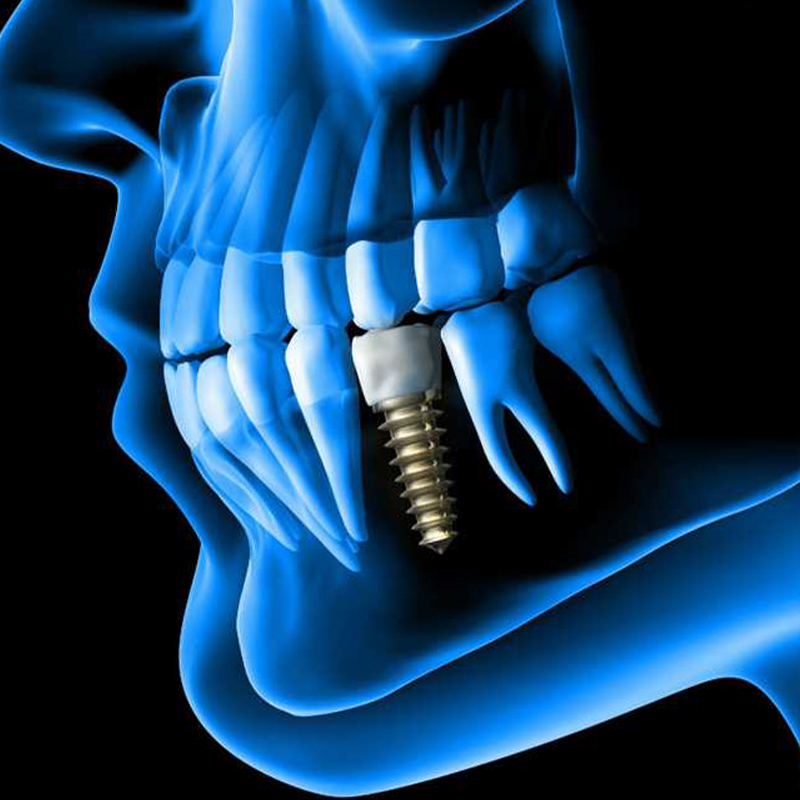Dental Implant
Treatment
Dental implants are a versatile treatment that comes in different forms for different dental problems. In addition to traditional dental implants that come as a single unit, we also have other options and types of implants available.
Some use only 4 implants to replace the entire jaw. But there are also multiple dental replacements that use dental bridges and implants to replace a number of teeth. There are also implants that can be placed immediately. As can be seen, dental implants are a large field.
The Benefits of Dental Implants
Dental implants always have a root, regardless of the type. And this root is necessary not only for strength, but also for your oral health. Here are some aspects of oral health that dental implants can affect.
Prevents Bone Loss
Dental implants promote circulation around the jawbone, which strengthens the tissue in the area. And as a result, it prevents the wear of the bone in the area.
Dental implants are a versatile treatment that comes in different forms for different dental problems.
Dental Implants
How Long Will It Hold?
Dental implants have a really long service life, regardless of the type. Since the process uses titanium root, it does not wear out or disappear. In fact, part of the treatment for dental implants is to fuse the jawbone with implants. That is, in other words, the root becomes part of Gabon, which gives it a lifelong foothold. But if it is for crowns or dentures that you use together with dental implants, it is a matter of care. On average, dental implants can remain intact for more than 15 years.
Types of Dental Implants
Single unit dental implants
All-on-4 dental implants
Emergency implants
Multiple tooth replacement
Advantages of the Implant
It allows you to chew better.
A better aesthetic appearance
By having bridges and fixed prostheses, the surrounding tissues are protected in a healthier way.
It is applied to patients who have lost all their teeth.
the retention problem that can be experienced in prostheses is resolved, and these patients have a chance to have fixed prostheses.
Patients who have lost part of their teeth get rid of the ugly image created by the hooks (hooks) to be used in moving prostheses that will be made, and a more aesthetic and functional result is obtained.
Apart from some health problems, implants can be done in cases such as single tooth loss, multiple teeth, and lack of all teeth (total toothlessness). In order for the implant to be applied in a healthy way, first of all, radiological and clinical examinations are performed in the area where the implant will be applied. By examining the bone density in the region and the condition of neighboring anatomical regions, it is decided whether implant construction is appropriate.
Other than regional eligibility; other conditions affecting implant construction include;
In patients with excessive cigarette consumption, the implant;
Smoking can adversely affect the bone integration of the implant due to carbon monoxide and toxic effects. It also has negative effects such as delaying wound healing and reducing blood supply. In this case, if your doctor approves, an implant can be made by reducing smoking before and after the implant.
Note: It is especially recommended that implant patients who smoke stop smoking 15 days before treatment and 1 month after treatment.
Implants for diabetics;
Implant construction may be risky in diabetic patients who are not under control. Although tissue healing is slow in diabetics, the risk of infection increases. An implant can be performed in patients whose blood sugar levels are under control.After the implant treatment is completed, it is very important to ensure oral hygiene for diabetics. Diabetes patients should not disrupt periodic dental checkups.
Implants in patients with heart disease;
Dental implants can be safely performed in patients with heart disease after consultation with a heart doctor.
In patients with hyper blood pressure, the implant;
In patients with high blood pressure, there is an overreaction in situations such as pain, stress, when overreacting to stimuli, blood pressure may rise acutely during dental treatment, and various complications may occur. For this reason; Before starting dental treatment of patients with hypertension, blood pressure measurements should be taken, a doctor’s consultation should be preferred.
Implantation in patients with blood clotting disorders;
Implant surgery is a risky procedure in patients with blood clotting disease. The necessary doctor’s consultations should be carried out.
Implant treatment is performed under local anesthesia, such as in dentistry treatments such as filling, root canal treatment, tooth extraction, or sedation (drowsiness) at the request of the patient. Patients do not feel any pain during treatment. After the implant application, the planned implant porcelain, movable prostheses are completed according to the patient and physician’s liking after several sessions of measurement procedures.
Factors Affecting the Success of Implant Treatment
What are the Criteria?
The chances of success in implant surgery are more than 90%. If these types of implants fail, this occurs within the first year after the surgical procedure. After this period, the implant failure rate decreases to 1% every year. Conditions that will reduce the integration of the implant into the bone environment by preventing blood flow to the bone and gums, such as trauma during surgery, infection around the implant, smoking, may affect the chances of success of the implant.
Other factors that will affect success;
The practitioner’s (surgeon’s) experience and manual ability,
The quality of the applied implant,
The patient’s bone quantity and quality,
Oral care and systemic condition of the patient,
An appropriate prosthesis is made on the implant.

İmplant
First of all, the general health status of the patient to be implanted is evaluated and an intraoral examination is performed. The suitability of the existing bone for the implant is evaluated with 3D radiographic images. The length and diameter of the implant is decided by making millimetric measurements on this radiograph. After the pre-planning is done, the procedure is started under local anesthesia. Slots are opened for implants in the jawbone and after the implants are placed in these sockets, the process is terminated by suturing. On average, 1 week after the operation, the sutures are removed and a control examination is performed.
Dental implant; They are titanium screws placed in the jawbone instead of missing teeth in the mouth. The missing teeth are filled with dental prostheses suitable for the patient such as crowns and bridges placed on these screws.
First of all, the general health status of the patient to be implanted is evaluated and an intraoral examination is performed. The suitability of the existing bone for the implant is evaluated with 3D radiographic images. The length and diameter of the implant is decided by making millimetric measurements on this radiograph. After the pre-planning is done, the procedure is started under local anesthesia. Slots are opened for implants in the jawbone and after the implants are placed in these sockets, the process is terminated by suturing. An average of 1 week after the operation, the sutures are removed and a control examination is performed.
In the first examination, the necessary clinical and radiographic examinations are performed by the oral and maxillofacial surgeons, and the general health status of the patient is evaluated and an intraoral examination is performed. The patient’s expectations from the treatment and the suitability of the existing bone for the implant are evaluated with 3D radiographic images. The length and diameter of the implant is decided by making millimetric measurements on this radiograph. Aesthetic evaluations are made and the most suitable superstructure is selected for the patient.
Dental implant application is a surgical procedure. It is a matter that should be considered in order not to cause irreversible problems to be experienced after the treatment by jaw surgeons who are experts in their fields and have sufficient equipment.
Fixed dentures are applied to patients who have to use removable dentures because there are not enough support teeth with implant dental treatment. Compared to the bridge application by cutting adjacent teeth; With implant treatment, the missing tooth in the mouth can be completed without cutting the adjacent teeth. In patients who use removable prosthesis but do not retain the prosthesis due to bone deficiency, implant retention can be increased by placing the implant and connecting it to the prosthesis. dental implant; Today, it is the treatment method used in tooth deficiencies.
Processing time may differ depending on the number of implants to be applied. The average implant head is placed by surgeons in 10 minutes.
The duration of implant treatment may vary from patient to patient. In some cases, the prosthesis phase can be passed on the same day with the application of all on four implants, and some patients may experience a period of adaptation due to additional surgical procedures. In an average of 3 months in the upper jaw and an average of 2 months in the lower jaw, the implants are expected to merge with the bone and porcelain coatings are applied on them. If additional procedures are performed in the presence of thin or insufficiently high bone, the waiting period may be extended up to 6 months.
It is undesirable for individuals who have an important uncontrolled systemic disease, who have received radiotherapy or chemotherapy recently. For this reason, it is an important issue for the surgeon to know the health history of each patient for whom an implant is prescribed.
Implant treatment can be applied to any patient whose growth development has been completed and whose health condition is favorable. The average age at which bone development is completed is 15-16 years for women and 17-18 years for men. After these ages, implant treatment can be performed at any age. According to studies and researches, old age does not pose a risk in implant treatment. Therefore, there is no upper age limit for implant application.
Some systemic disorders may prevent dental implant applications. Detailed information about your health status should be given to the physician who is referred for treatment.
In many studies, it has been proven that smoking prevents bone integration with the implant. In smokers, the probability of implant falling out is 2-3 times higher than normal.


